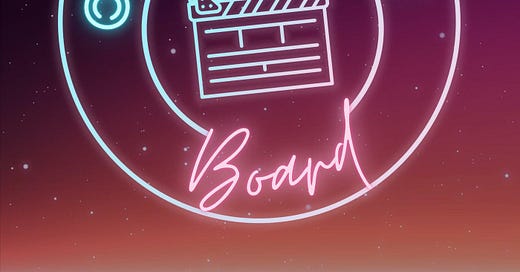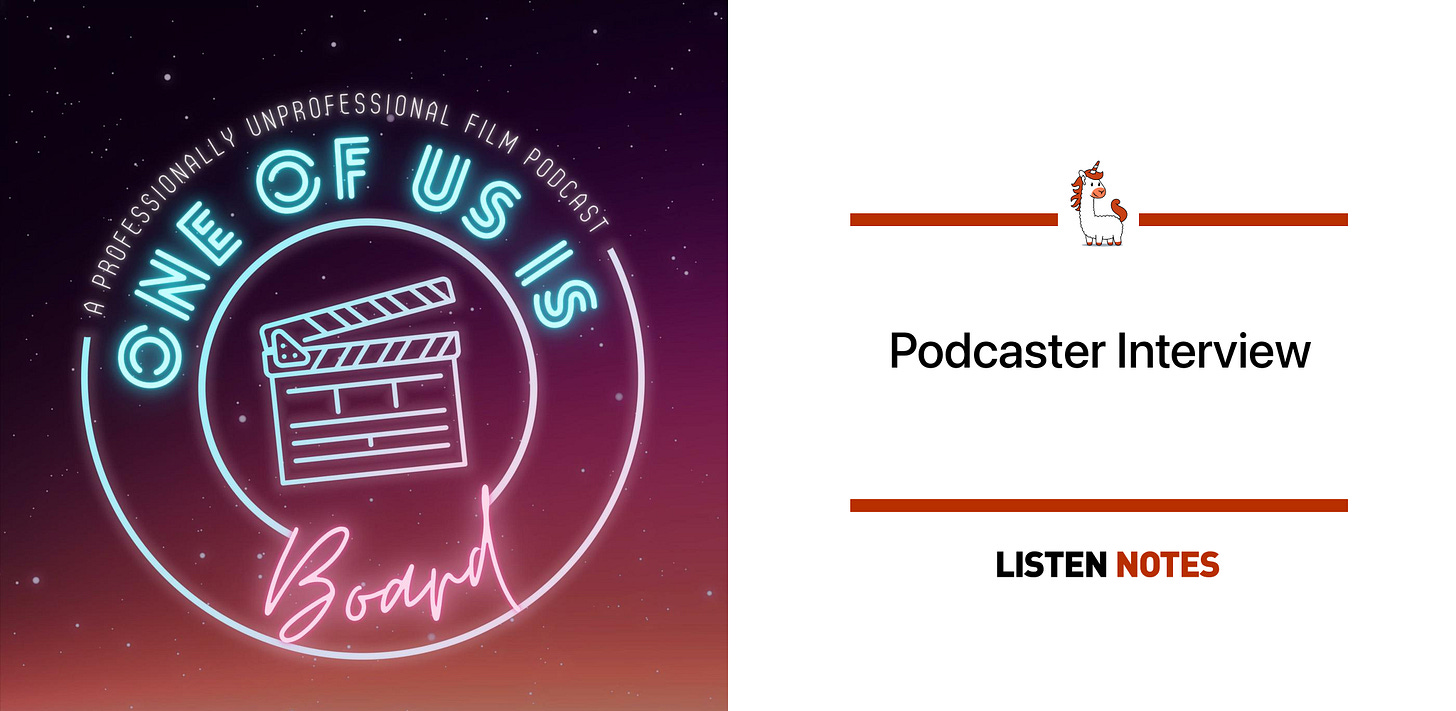Two Scottish graduates try to put their degrees in Film & Media to use by discussing movies in a fun and accessible way.
"If you focus too much on hitting specific figures, you will lose your passion for your show."
Today Sam & Calum, the creators of One of us is Board share their story of TV & Film podcast.
► Tell us about you and your podcast
We originally described One of us is Board as "the professionally unprofessional podcast." As time has gone on, this tagline has felt less accurate to the image of our brand. In its current form, OOUIB is a film podcast in which we (Sam & Calum) sit down once a week to discuss a film we've seen, and which relates to a predetermined theme. We were aware of a lot of film podcasts which would provide deep, detailed discussions that often went into the background of how movies were made, beyond simply discussing the plot of the film. We felt there was a gap in the market here, as most film-watchers aren't as invested in that sort of thing, but would rather talk about what they liked and didn't like. We wanted to appeal to casual viewers, and to keep discussion light and focussed purely on what we've watched rather than the making of it or the story behind the camera.
► Why & how did you start this podcast?
We both graduated with degrees in Film & Media in 2017. Before graduating and while we were still studying, we tried a few side projects, including setting up a YouTube Channel and a website. None of these endeavours took off in the way we hoped and we quickly lost motivation to pursue them any further.
Several years after university, we were both established in our respective post-graduate careers. Despite this, we weren't really putting many elements of our degrees to use. The idea for the podcast was born from a desire to remedy this. We wanted an outlet to talk about films, and we were both interested in the concept of podcasting. At the very least, this seemed like an opportunity to learn a new skill or try something a bit different.
Our first episode went out about a month after our initial conversations and provided plenty of opportunities to learn. Initially, we made use of Spotify for Podcasters' (then known as Anchor) ability to embed tracks from Spotify into the episode. This would split your episode up into segments with musical interludes. The downside of this was that we couldn't share episodes produced in this way to other platforms, so we quickly changed tack.
Quite rapidly we built a small number of regular listeners, which only grew further when we set up an Instagram account for the show and started promoting it there. Since then we've kept going, making tweaks and improvements as we've gone. Our artwork and imagery are a lot more slick; our episodes are more focussed; and we don't make them last longer than we need to. We'll hit our third anniversary in January 2024, and all of this seems to be working for us so far!
► How'd you find the time and funding to do this podcast?
We release a brand new episode every Monday. Each Sunday we schedule time to record the episode, which is then edited between Sunday night and Monday morning. Both of us work full-time, so finding a schedule that worked for us was a difficult process. After a couple of years of trial and error, this routine now works well for us as it takes the least amount of time out of our schedules while still allowing us the room to produce high-quality episodes.
We are a very low-budget show, but we do use Adobe Audition for editing. Spotify for Podcasters provides free hosting, and we recently changed our recording method as the program we were using decided to implement a fixed price for continued use. We do all the marketing, producing, and editing ourselves. It is a passion project and while we want to ensure we produce good content, we spend much more time than money on the podcast. Thankfully, there are tools available that have provided help at low to no cost. The most expensive part of the show, other than the Adobe subscription, is our microphones. We fund the show through our day jobs.
► What do you gain from podcasting?
While we have had sponsorship offers, we have so far declined all of them. We want our show to be fun, not just for the listeners, but also for ourselves. At the moment, sponsorship would have the potential to change our fun project into a stressful extra job. The offers we received required us to read long advertisements, which we felt produced an overall negative impact on the show's quality.
We make the podcast for the fun of it. One of us is Board is a creative outlet for us and it is something we enjoy doing. It's also enabled us to learn a ton of new skills that we have then been able to take forward with us to our full-time jobs. Building the brand has also been an asset as it has allowed us to venture out into other avenues beyond podcasting. We've made some film projects under the One of us is Board name, which wasn't originally part of the plan, but has certainly provided an interesting opportunity for expanding our skills and further promoting the brand. We are open to monetizing in some way, but it isn't a priority and we won't do it to the detriment of the show.
► How does your podcasting process look like?
The process begins with choosing the theme of the month. Every month we will choose a theme that all the films have to follow. Previous themes have included films about nuns ("November"), classic horror films, or Jeff Goldblum movies. Throughout the week we will both watch the film and then we will record on Sunday night, sharing our thoughts with each other, often with little to no prior knowledge of the other's opinions. We record locally using Blue Yeti microphones which record directly into Audacity, while we use Facebook Messenger's call function to hear each other. This has been a surprisingly effective way of getting clean, clear audio for editing without the need to be in the same location.
The podcast is edited on a Sunday night/Monday morning on Adobe Audition. A one-hour episode will take roughly three hours to edit. This includes making the episode artwork, which is done in Adobe Photoshop. The show is then distributed via Spotify for Podcasters for our listeners to enjoy.
► How do you market your show?
We market our show through two main channels - Instagram and YouTube. We also have a website for the show and in the future we hope to utilize SEO to rank for more relevant search terms to get a larger audience. There is a solid film podcast community on Instagram and we all help each other, be that through collaborations or through sharing each other's shows. Spotify has been invaluable in helping grow the show. 50% of our listeners come through Spotify, although audiences on Amazon Music and Apple Podcasts are both growing.
We share shorts on our YouTube channel. YouTube is heavily pushing shorts at the moment, and taking advantage of this has helped to give us some extra exposure. Word of mouth, of course, is also very important.
► What advice would you share with aspiring (new) podcasters?
Statistically, most podcasts don't make it to seven episodes before the hosts give up. If you focus too much on hitting specific figures, you will lose your passion for your show. Success doesn't come instantly, This is a good thing as it will take time for your show's content to reach the quality you would want it to achieve. Take the time while you have lower listener numbers to refine your content. It's important to make sure you have an understanding of what it is you are trying to do and what makes your product unique.
Many podcasts fall into the trap of just reading a Wikipedia page or information they get online, which isn't particularly entertaining and is something the listeners could do themselves. We fell into this habit ourselves initially, but it's important to offer more, whether that's personal insights and reflections, or well-researched and detailed information.
The other piece of advice we'd offer relates to money - don't spend lots of cash while you're trying things out. Of course, it's nice to have an expensive mic and a proper studio setting to record in, but if this becomes a hobby that you drop quickly, you don't want to look back and find you've sunk loads of money into it for little to no reason.
► Where can we learn more about you & your podcasts?
You can find us:
- via our website - www.oneofusisboard.com
- on Instagram - @oneofusisboard
- and on YouTube and your streaming platform of choice by searching for "One of us is Board".




